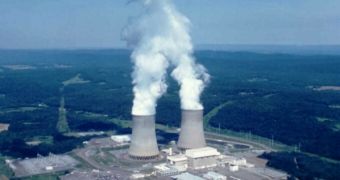With many countries in the world, and especially the Middle East, announcing their intentions to build nuclear power plants in the next decade, the risk of more fuel production and reprocessing facilities, capable of creating weapons-grade uranium and plutonium increases sharply. In an attempt to stop this proliferation the International Atomic Energy Agency (IAEA) is looking for measures to implement, which would bring at least rogue states, such as Iran, under international oversight.
Germany has already proposed that some nations could cede their sovereignty over small portions of their land, where reprocessing plants, controlled by the IAEA could be created, thus bringing observers in various regions of the globe. The need is especially important in the Middle East, where Israel, India, Pakistan, and potentially Iran, already have nuclear weapons, and other Arab countries announced their intentions to build some 12 nuclear facilities within 10 years.
The problem with international oversight, specialists say, is that every country needs to join in, meaning that even the United States, the Russian Federation and the United Kingdom would have to give up the rights to control their own facilities, which doesn't seem very likely to happen. But German representatives say that this solution is better than the alternative.
“In an international arrangement for fuel assurance, co-operation between fuel-service companies, governments, and the International Atomic Energy Agency is required. While it is conceivable that companies just agree among each other by contract to jump in when one of them falls out of a supply commitment – after the model of re-insurance of insurance companies – this would hardly be a reliable system without the consent of government to grant the necessary licenses in such emergency cases; in other words, the participating governments must have an agreement among themselves not to prevent emergency supply under such circumstances ,” reads a report released by the Weapons of Mass Destruction Commission (WMDC).
In a promising first step in the direction of multilateral nuclear arrangements (MNA), the IAEA created an emergency nuclear fuel stockpile, from which all nuclear countries could benefit, if their regular suppliers were to suddenly cut shipments.
"Multilateral mechanisms should offer a real alternative to countries to forgo developing their own national enrichment and reprocessing capabilities," said EU high representative Javier Solana, in Brussels last month.

 14 DAY TRIAL //
14 DAY TRIAL //